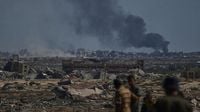In a dramatic turn in the nearly two-year war in Gaza, U.S. President Donald Trump on Friday ordered Israel to halt its bombing campaign, following Hamas’s announcement that it had accepted key elements of Trump’s proposed peace plan. The move, which came after months of mounting casualties and devastation in the Gaza Strip, has opened a potential—if precarious—window for negotiations to end one of the region’s deadliest conflicts in recent memory.
According to the Associated Press, Trump’s directive to Israel came just hours after Hamas said it was willing to release all remaining hostages taken during its October 7, 2023, attack on Israel and to hand over governing power to other Palestinians. However, the group emphasized that some aspects of the U.S. plan, particularly those concerning Gaza’s future governance and the rights of Palestinians, would require further consultations and consensus among Palestinian factions.
Trump, eager to deliver on his campaign pledges to end the war and secure the return of Israeli captives, responded on social media: “Israel must immediately stop the bombing of Gaza, so that we can get the Hostages out safely and quickly! Right now, it’s far too dangerous to do that. We are already in discussions on details to be worked out.” He later added, “I believe they are ready for a lasting PEACE.”
The president’s 20-point plan, which he unveiled earlier this week alongside Israeli Prime Minister Benjamin Netanyahu, calls for Hamas to immediately release the 48 remaining hostages—about 20 of whom are believed to be alive—give up power, and disarm. In exchange, Israel would halt its offensive, withdraw from much of Gaza, release hundreds of Palestinian prisoners, allow a surge of humanitarian aid, and abandon controversial plans to relocate much of Gaza’s population. The densely populated territory of some two million Palestinians would then be placed under international governance, overseen jointly by Trump and former British Prime Minister Tony Blair.
Yet the plan, while accepted by Israel and welcomed by international mediators, has not resolved all sticking points. Hamas’s official statement, as reported by Al Jazeera, made no mention of disarmament—a key Israeli demand—and insisted that the future of Gaza and the rights of its people must be decided by a “unanimous Palestinian stance” and in accordance with international law. Senior Hamas officials, including Mousa Abu Marzouk, made clear that the group would not accept foreign administration of Gaza, nor the entry of foreign forces, calling such proposals “unacceptable.” Abu Marzouk told Al Jazeera that while Hamas was open to handing over its weapons to a future Palestinian body, this was not included in the official statement.
On the ground, the response to Trump’s order was mixed and, in some cases, uncertain. Al Jazeera’s Hani Mahmoud, reporting from Deir el-Balah in central Gaza, described an unusual quietness overnight, with a noticeable reduction in the intensity of Israeli bombardment and the absence of the ever-present drone noise. However, smoke still rose over parts of the enclave, and sporadic gunfire and military movements persisted. “Compared to the past few days, the intensity of the bombardment and the use of extreme firepower is definitely less this morning and could be the beginning of a complete halt. But we don’t know when that is going to happen,” Mahmoud said.
Israel’s official response was delayed, as much of the country was shut down for the Jewish Sabbath. However, Israeli media reported that the government had instructed the military to reduce offensive activity in preparation for the “immediate implementation” of the first stage of Trump’s plan. Prime Minister Netanyahu, reportedly “shocked” by Trump’s public statements and Hamas’s unexpectedly positive response, faced mounting political turmoil at home. According to Al Jazeera’s Hamdah Salhut, opposition leaders signaled they might offer Netanyahu a political safety net, possibly forming a unity government if right-wing coalition members balked at the peace deal. Protests by families of Israeli captives and other groups were expected to erupt within 24 hours, as many inside Israel voiced support for halting the bombardment to protect hostages still held in Gaza.
The international community reacted swiftly. Mediators Egypt and Qatar welcomed Hamas’s statement, with Qatar’s Foreign Ministry spokesperson Majed al-Ansari confirming ongoing discussions with Egypt and the United States. The United Nations Secretary-General Antonio Guterres urged all parties to “seize the opportunity to bring the tragic conflict in Gaza to an end.” French President Emmanuel Macron echoed this sentiment, declaring on social media, “the release of all hostages and a ceasefire in Gaza are within reach!”
Despite the diplomatic flurry, deep-seated mistrust and unresolved issues linger. Hamas’s reservations about the proposed international “Board of Peace”—which would see Trump and Blair overseeing Gaza’s administration—stem from fears that the arrangement would isolate Gaza from the broader Palestinian cause and undermine prospects for eventual reunification with the Israeli-occupied West Bank. Senior Hamas official Osama Hamdan told Al Araby television, “We will never accept anyone who is not Palestinian to control the Palestinians,” singling out Blair as especially unwelcome due to his role in the 2003 Iraq invasion.
For Palestinians, the war’s toll has been catastrophic. Gaza’s Health Ministry, part of the Hamas-run government but widely considered the most reliable source for wartime casualties, reports that more than 66,200 people—mostly women and children—have been killed since October 2023. The offensive has displaced around 90% of Gaza’s population, often multiple times, and left vast areas uninhabitable. Olga Cherevko, a spokesperson for the U.N. humanitarian office, described seeing families living in the parking lot of Shifa Hospital, unable to flee south due to lack of resources. “One of the families had three children and the woman was pregnant with her fourth. And there were many other vulnerable cases there, including elderly people and people with disabilities,” she told the Associated Press.
The war began with a shocking Hamas-led assault on October 7, 2023, in which militants stormed into Israel, killing about 1,200 people—mostly civilians—and abducting 251 others. Israel’s retaliatory campaign has since flattened neighborhoods, sealed off the territory from basic goods, and pushed Gaza City to the brink of famine, according to experts cited by AP.
Both the Biden and Trump administrations have struggled to end the bloodshed while supporting Israel militarily and diplomatically. Trump’s latest initiative—backed by key regional and international players—marks the most significant push yet to halt the violence and bring home the remaining hostages. But as deadlines loom and negotiations intensify, the outcome remains uncertain. As Al Jazeera’s Ali Hashem put it, “Hamas showed a lot of positivity here by accepting the spirit of the paper and praising President Trump’s initiative. In this way, they are showing that they are ready to extend their hand. However, they have reservations; they have some points that they want clarification over, and the ball now is in President Trump’s court.”
With the world watching and hopes for peace flickering, the coming days will test whether this fragile opening can be transformed into a lasting end to Gaza’s suffering and a new chapter for the region.






